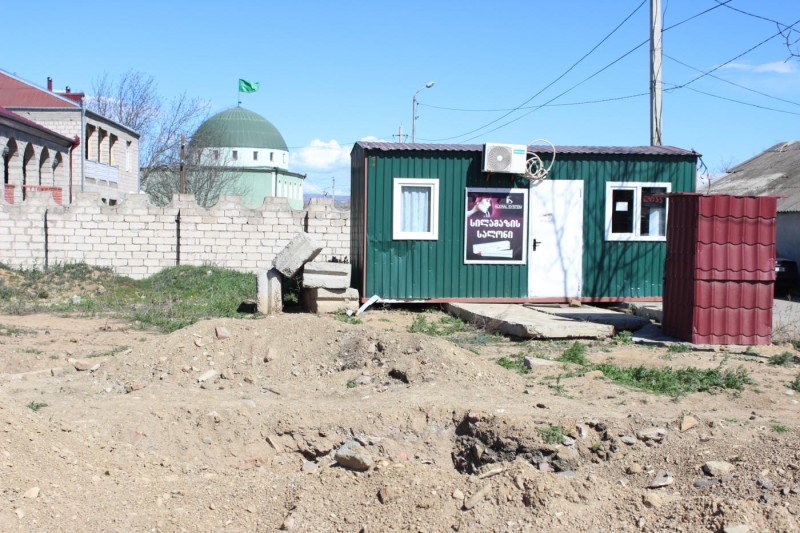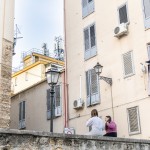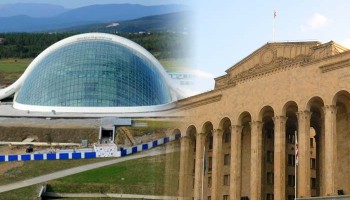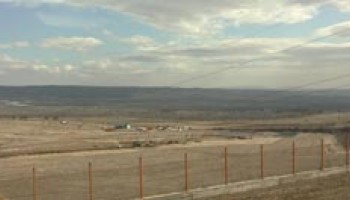Lower Ponichala, Georgia - Until recently, this crumbling post-industrial suburb of Tbilisi was best known for cut-rate car repairs and meat kebab stalls.
But now the district has become a byword in Georgia for drug crime.
Starting in August 2016, the government launched a series of drug raids focusing on Lower Ponichala -- not to be confused with the newer, more prosperous Upper Ponichala -- and they’re still ongoing. Last year, Minister of Internal Affairs Giorgi Gakharia stood up in front of Georgia’s parliament and told lawmakers that there were three main hubs of drug trafficking in the country: the internet, dance clubs, and Ponichala. And videos depicting drug use and mayhem in the district have gone viral among Georgians online.
But for locals, the truth is harder and sadder. Some say they are startled by the speed at which their community, where doors were routinely left unlocked and life was lived on the streets, has been engulfed by drug crime.
Although Lower Ponichala was always known as a rough area, populated mainly by ethnic Azeris who have struggled to assimilate into Georgian society, drugs were never used on the street as brazenly as they are today, locals told OCCRP.
“This is a place with many troubles,” said Rahid Karimov, the imam of the local mosque, who has presided over three or four funerals of young men who overdosed on drugs this year. “Nowadays selling drugs has become a simple business. It is disturbing…. It is not a secret anymore.”
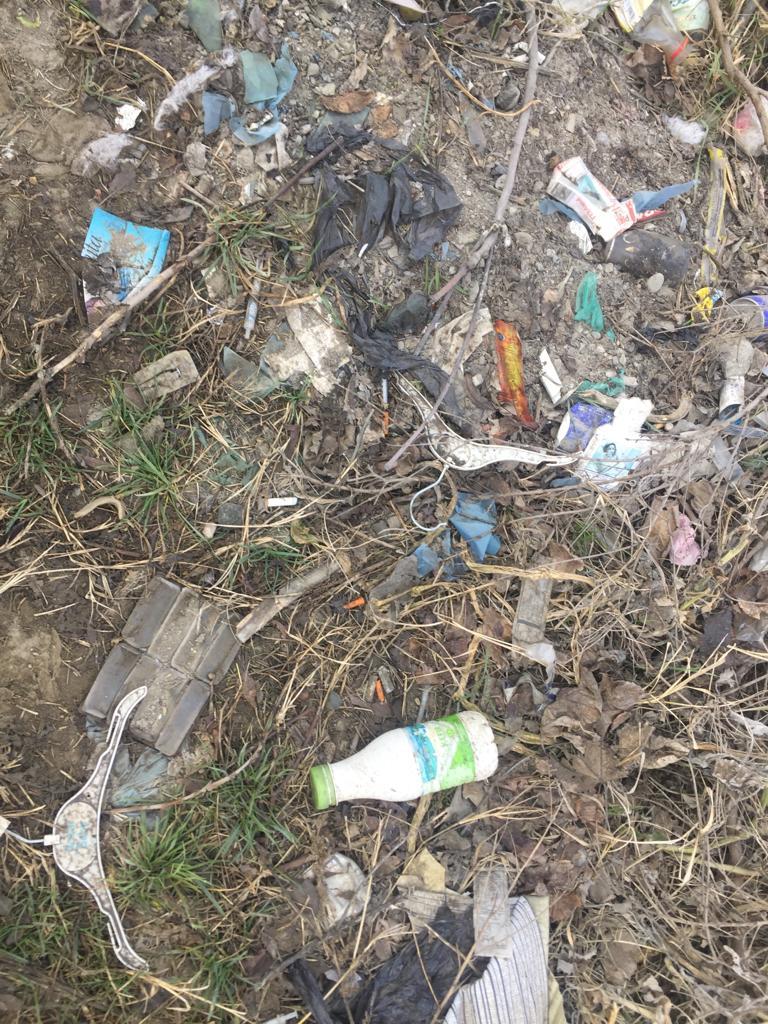 Syringes and other detritus in Lower Ponichala’s graveyard. (Credit: Ulviyya Aliyeva)Even the local cemetery has not been spared. It is now littered with syringes and other drug paraphernalia, and when dawn breaks over the suburb, people living nearby can often see the shadows of injectable drug users moving among the graves, dark against the lightening sky.
Syringes and other detritus in Lower Ponichala’s graveyard. (Credit: Ulviyya Aliyeva)Even the local cemetery has not been spared. It is now littered with syringes and other drug paraphernalia, and when dawn breaks over the suburb, people living nearby can often see the shadows of injectable drug users moving among the graves, dark against the lightening sky.
This community of around 6,000 people is also divided about whether the recent drug raids have been helping, or just making things worse. Some say the government should be tougher on drug users in Ponichala. Others say they are being scapegoated because they are ethnically Azeri, and that the crackdowns are just window-dressing, designed to show that the government is being tough on crime.
But there appears to be widespread consensus among the community that the raids mostly scoop up low-level drug users and petty dealers while leaving the roots of the trade untouched. During the most recent operation, in March, Ponichala’s women came out in droves to rush the police cars, screaming and throwing rocks at police cars as their husbands, fathers, and brothers were carted away. “They planted it!” shrieked one woman over and over. “They planted it!”
David Subeliani, head of the White Noise Movement, a Georgian organization that advocates for drug policy reform, does not believe that the drug problem in Ponichala is much worse than in other parts of the country.
“The Ministry of Internal Affairs needs success stories from time to time. That is why they have so many special operations there,” he said.
“When they do something in Ponichala, it is always about drug dealing. Even if they catch someone who is not involved in drug dealing, they portray them as a drug dealer,” Subeliani added.
Bayram Jafarov, a district official, also said the internal affairs minister was wrong to publicly single out Ponichala as drug trafficking hub.
“Ponichala is not alone,” he told OCCRP. “The situation is the same in other regions.”
Georgia’s Ministry of Internal Affairs declined repeated requests for an interview on its raids in Ponichala or statistics on drug crime there. However, it issued a statement following a March raid, saying that an investigation had found an organized group in Ponichala that was “heading the spread of narcotics in Georgia.”
Zaur Khalilov, the executive director of the Civic Integration Foundation, which works with ethnic Azeri communities in Georgia, said Lower Ponichala was indeed a major problem area and a center of the drug trade. Working with Azeri prisoners, he often encountered entire extended families — men, women, and children — running small-scale drug sales operations out of their homes.
“I used to joke that those people are dealers since they were born,” he said.
But he also said there were serious problems with how the police dealt with the population. He alleged that “powerful people and politicians” sometimes protected high-level drug traffickers, or set them back on the streets after they paid bribes.
“As a community where many people are dying of drug overdoses, it’s easy to demonize Ponichala,” he said. “The government wants to show they are fighting drugs by arresting small drug dealers.”
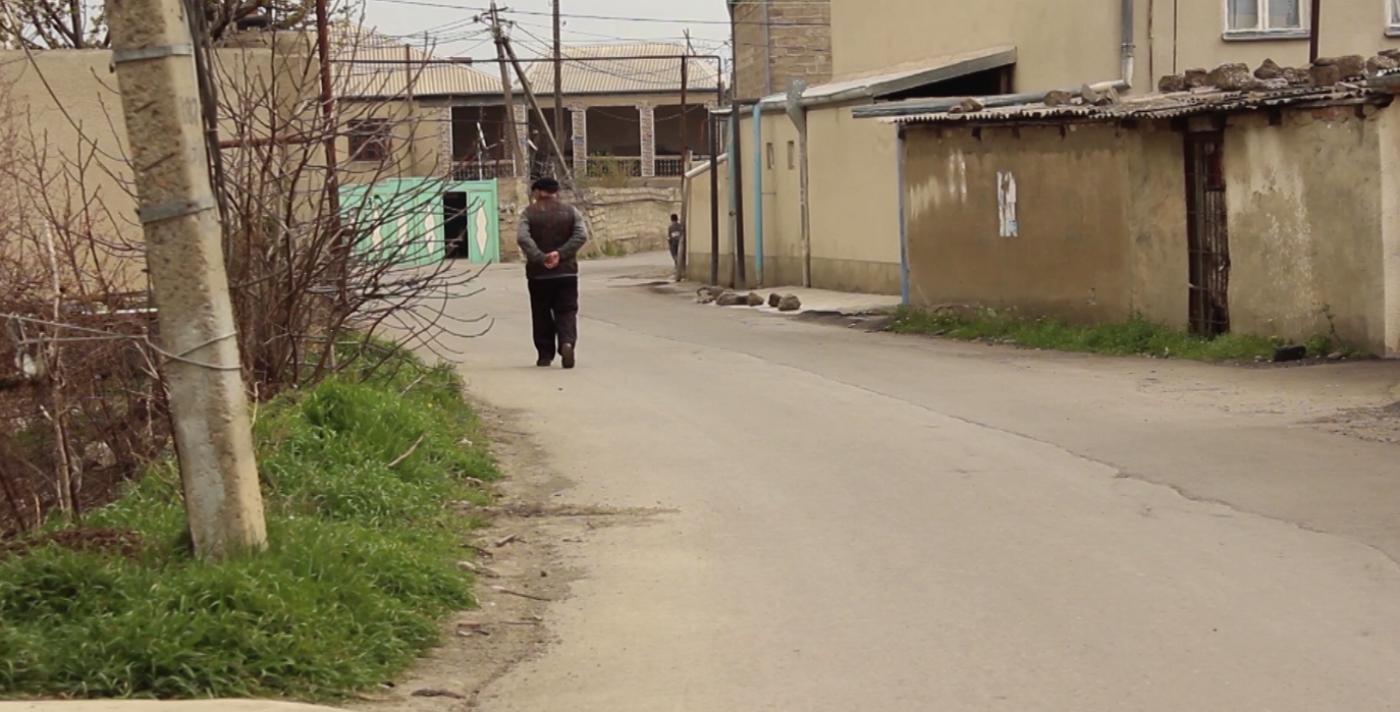 A street in Lower Ponichala. (Credit: Ulviyya Aliyeva)
A street in Lower Ponichala. (Credit: Ulviyya Aliyeva)
Life on the Streets
Gossip flies fast and furious in Lower Ponichala, where it seems like everyone knows all there is to know about their neighbors — if they’re not already related.
Clusters of people gather around the plumes of smoke that rise up from street carts selling the Central Asian kebabs known as shashlik and chat the day away, mostly in Azeri, the language of daily life here.
The majority of Georgians are Orthodox Christian, but Lower Ponichalans are Muslim and their cultural orientation is towards the south: They listen to Azeri music, maintain Azeri customs — including forced marriages, where men abscond with women that strike their fancy — and maintain allegiance to Azeri underworld figures. (An alleged gangster known as Thief Guli is especially popular; although he has not lived in Georgia for years, Ponichalans threw a birthday party for him this year and danced around a cake bearing his portrait.)
“In our village everyone knows everything about each other: who eats what, who sells what, who drinks what,” said one young man, who asked to be identified only by his first initial, E.
But these days, the gossip on the streets of Ponichala often gravitates from songs and drinks to drugs: where they might be coming from, who might be selling them, who is profiting, who is dying.
There are whispers that heroin and methamphetamines are smuggled into town in truckloads of vegetables. Others speculate that they arrive in shipments of industrial salts from Iran. Some say Ponichala is a drug wholesale center for all of Georgia. Others say the main customers are just individual users, who taxi into town and get drugs thrown down from the windows of abandoned houses in bottles of energy drinks.
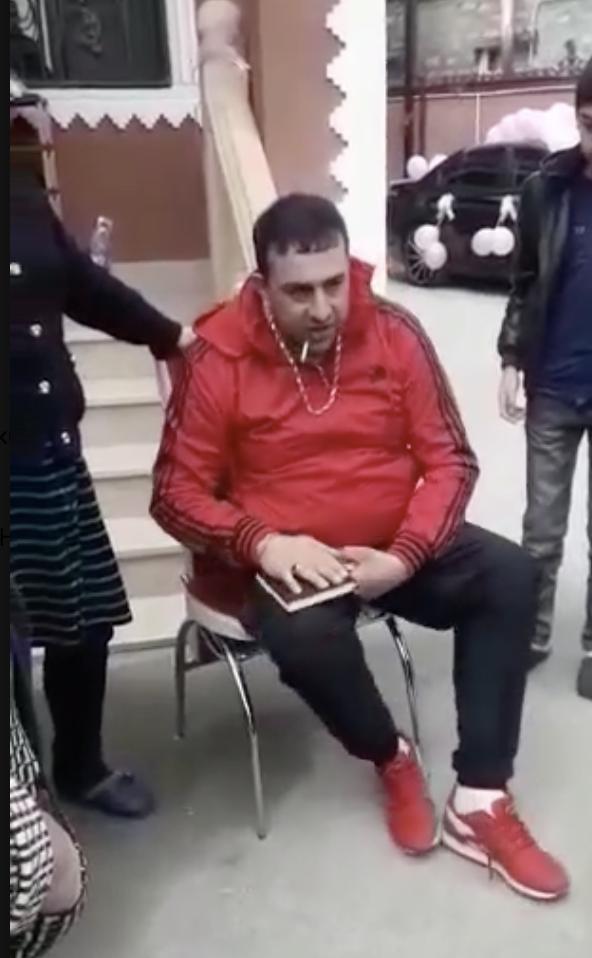 Rahman Babayev swearing on the Koran to renounce drugs. A few days later, he was dead. (Credit: WhatsApp)And everyone says they are fed up.
Rahman Babayev swearing on the Koran to renounce drugs. A few days later, he was dead. (Credit: WhatsApp)And everyone says they are fed up.
“They [drug dealers] have so many connections, opportunities,” said the young man, who spoke on condition of anonymity because he was afraid of repercussions within the small community. “They can do everything with money. That is why no one wants to interfere with them, because when you interfere they start bothering your relatives.”
When Lower Ponichalans become rich, the assumption is that they have entered the drug trade, because there are so few other economic opportunities. These people, usually young men, are warily idolized because there are few other idols.
In March, the community was riveted but shaken by the death of just such a local personality, Rahman Babayev. He had caused a stir after he was caught on camera waking up from an apparently drug-induced coma and swearing on the Koran that he would never use drugs again. But then, two days after a police raid on Lower Ponichala that saw one of his relatives arrested, he dropped dead at the age of 38. The word on the street was that he died of shock, although no one knew how.
Another local kingpin, known as Vaso, became famous in Ponichala for his car. Before his arrest, he sparked controversy in the district when a well-known Azerbaijani musician, Ilkin Cerkezoglu, wrote a song dedicated to him, “Let’s Smoke Weed in Vaso’s Black Hummer.” A video circulated of the two men laughing wildly in the eponymous car as the song played in the background. When Vaso was imprisoned after a drug raid in February, some locals applauded the arrest. His mother, Ofelya, enraged at what she saw as her neighbors’ hypocrisy, recorded an angry voice message that she circulated through WhatsApp chat groups.
“You saw sweet things from Vaso, but you won’t see them anymore!” she exclaimed, apparently referring to her son’s material generosity.
New Policies, Old Problems
Most of Lower Ponichala’s women can speak only a smattering of Georgian, making it difficult for them to work or even travel outside their village. Even for men, there are few economic opportunities other than car repair, a trade Ponichala is known for. When Georgia was part of the Soviet Union, this was a factory district and most people had industrial jobs. But after the fall of the Communist state in 1991, that all went away.
“When the Soviet Union collapsed, the situation got really bad,” said a 53-year-old woman who spent much of her life in Lower Ponichala, speaking on condition of anonymity because she was afraid of being targeted by drug dealers.
She said drug use in the village began to rise in the 1990s, but fell dramatically during President Mikheil Saakashvili’s administration from 2004 to 2013. Under him, this small Caucasian nation was known for draconian drug laws, part of a push by the self-styled reformer to have “zero tolerance toward petty crime.”
In 2012, however, the Georgian Dream coalition was voted into power, promising, among other things, criminal justice reform. An amnesty saw more than 3,000 prisoners released from jail. Despite vociferous criticism from Saakashvili, who called it a “mass release of criminals,” Bidzina Ivanashvili, the billionaire leader of Georgian Dream, said many of those pardoned had been arrested unfairly.
The number of recorded drug crimes, including possession and drug dealing, shot up from 3,166 in 2012 to 10,635 in 2013, before leveling out at around 7,000 per year. Although no separate statistics are kept for Lower Ponichala, last year more than 17 percent of the 1,079 drug-related crimes in Tbilisi occurred there. (The population of the district is less than .5% of the population of the capital as a whole.)
Georgian Dream’s takeover coincided with the rise of a grassroots drug legalization movement, spearheaded by a new generation of sophisticated young urbanites. Ultimately, after mass protests in Tbilisi over harsh drug laws, possession of small quantities of marijuana for personal use was decriminalized in 2017.
But Human Rights Watch says that penalties for drug crimes are still too severe in Georgia, with prison terms for drug use and possession sometimes higher than those for rape or murder.
“Although the Georgian government has partially liberalized its drug policies since 2012, they remain harsh,” the rights group said in a report last year. “The criminal justice system continues to treat most drug consumption or possession for personal use as a criminal felony, with severe consequences.”
According to the Georgian Harm Reduction Network, a non-governmental organization that works with drug users, the number of drug overdoses in Georgia increased from 249 to 1,295 between 2015 and 2018, and 20 people have died of overdoses in the past two years.
However, there are no reliable statistics on overdoses and deaths in Georgia, making it difficult to trace the effects of government policies, according to David Otiashvili, the executive director of the Addiction Research Centre in Tbilisi.
“There is no official information about how many people die. We have several problems with the facts of some cases. People die of a drug overdose, but the family tries to hide it and reports a different reason.”
Indeed, accurate statistics on drug use and arrest breakdowns by district are hard to come by.
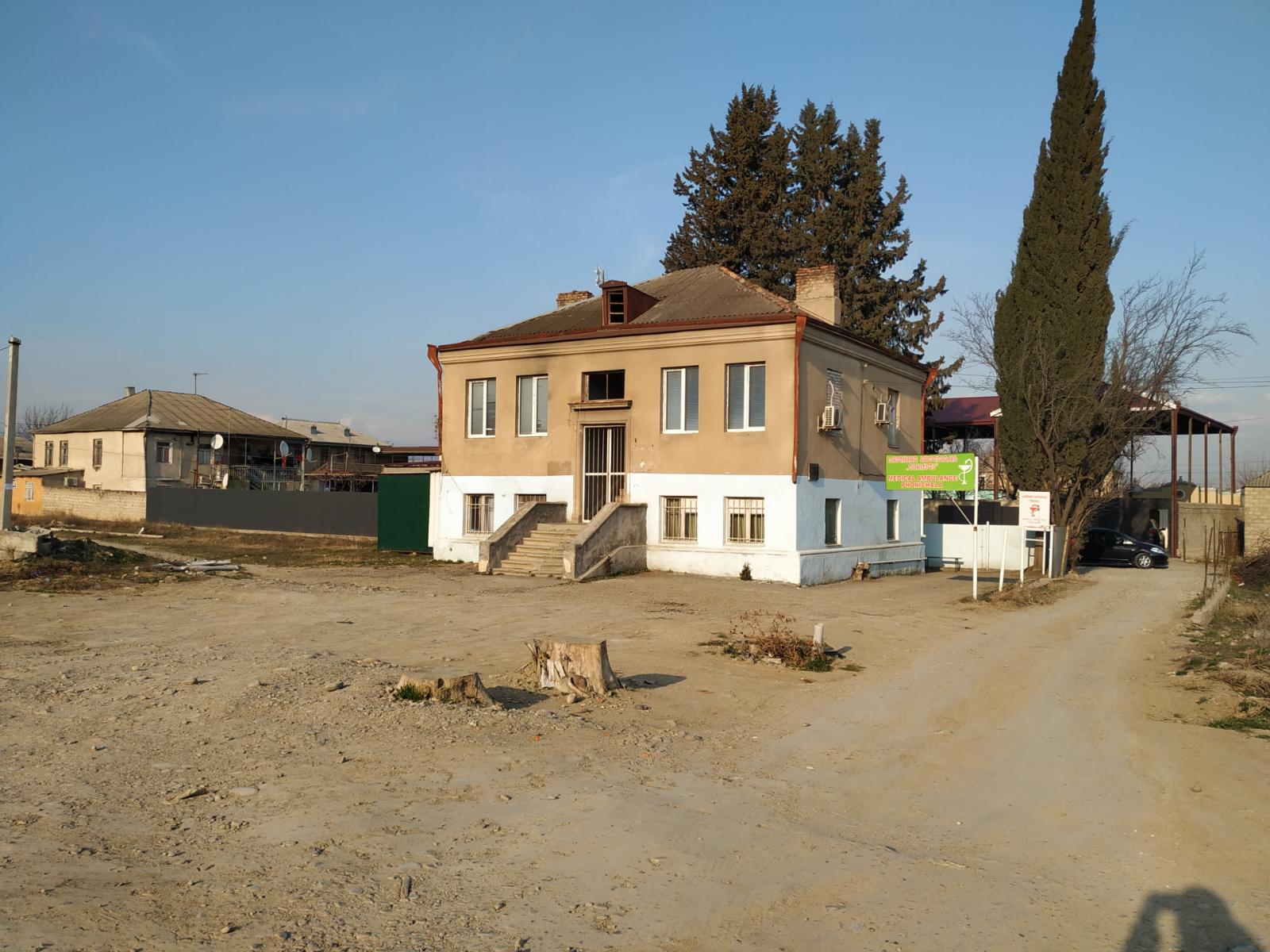 The clinic in Lower Ponichala where Emzar Abuladze works. (Credit: Ulviyya Aliyeva)
The clinic in Lower Ponichala where Emzar Abuladze works. (Credit: Ulviyya Aliyeva)
Emzar Abuladze, the head doctor of a Lower Ponichala clinic, says it feels like someone in the village is arrested every week for drug-related crimes. He said he had heard of two fatal overdoses in the past five or six years, but he did not have detailed figures.
“I don’t know the real reasons. But basically, people are not provided with work. That is why this work [drug dealing] seems to be making good money,” he said.
Locals interviewed this year said they felt the situation in Lower Ponichala was the worst it has ever been.
E., for example, left for a year to study abroad. When he came back home in 2016, his house had become a squat for drug users. Angry and incredulous, he reported the situation to journalists and non-governmental organizations in the hopes of calling attention to the problem. Soon he began to receive anonymous threats on Facebook.
“Aren’t you afraid of writing such things?” one ominous message said. “Aren’t you afraid that something will happen to you?”
Last year he decided to leave Ponichala for good, giving up on the idea of reclaiming his house.
“Now, the situation is really the worst,” he said.
Karimov, the imam, said he had tried in vain to remonstrate with drug dealers, especially since he feared they were starting to recruit children to the trade.
“When we say it publicly, then we hear them say ‘It is not your job, it is business. It is my job. Go and do prayers and continue your religion,’” he said wearily, sitting in his room at the mosque.
But like many other Ponichalans, he said he was tired of living in a place that was always targeted by police and politicians, but where nothing ever seemed to improve.
“Killing someone is better than selling drugs. Because when you kill someone, you kill only that person. But a drug sale can destroy hundreds of people,” he said.
